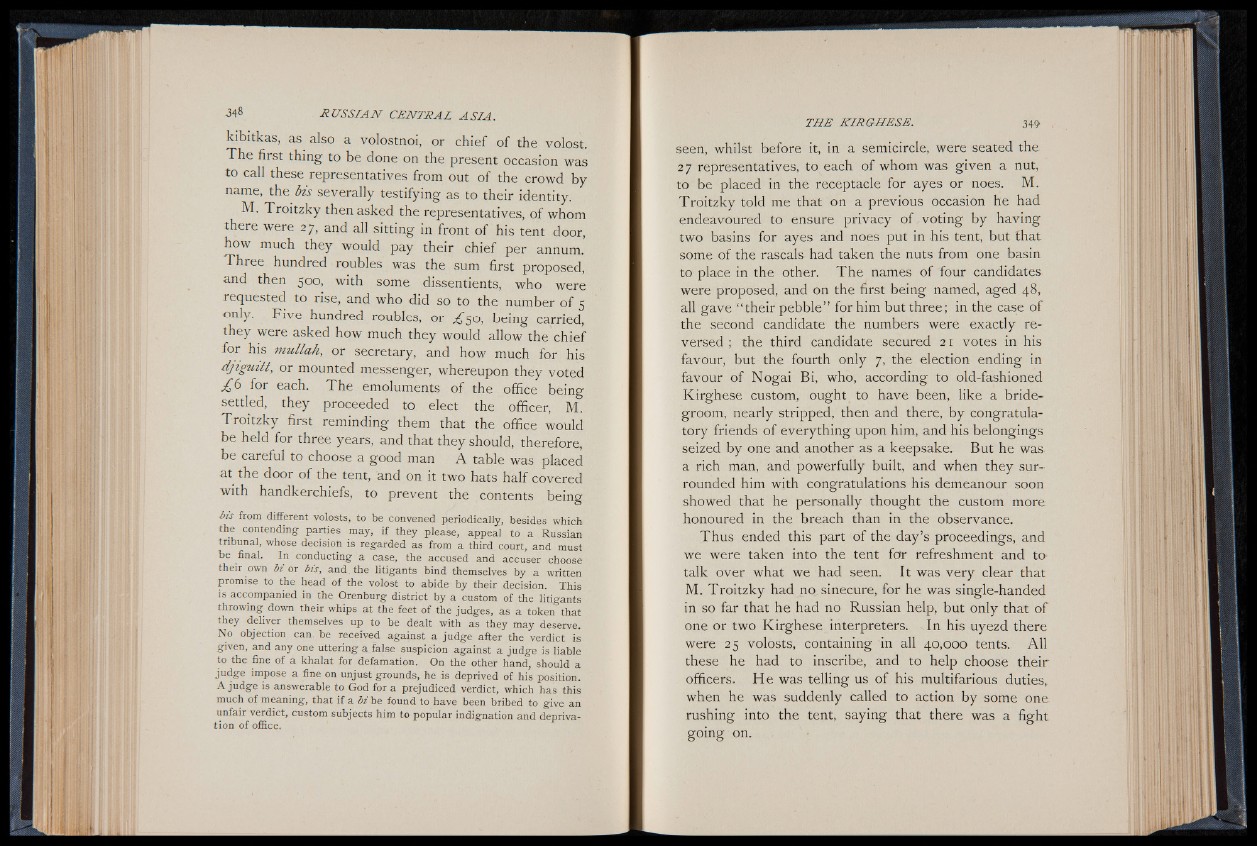
kibitkas, as also a volostnoi, or chief of the volost.
T he first thing to be done on the present occasion was
to call these representatives from out of the crowd byname,
the bis severally testifying as to their identity.
M. Troitzky then asked the representatives, of whom
there were 27, and all sitting in front of his tent door,
how much they would pay their chief per annum.
Three hundred roubles was the sum first proposed,
and then 500, with some dissentients, who were
requested to rise, and who did so to the number of 5
only. Five hundred roubles, or ¿50, being carried,
they were asked how much they would allow the chief
for his mullah, or secretary, and how much for his
djiguitt, or mounted messenger, whereupon they voted
for each. The emoluments of the office being
settled, they proceeded to elect the officer, M.
Troitzky first reminding them that the office would
be held for three years, and that they should, therefore,
be careful to choose a good man A table was placed
at the door of the tent, and on it two hats half covered
with handkerchiefs, to prevent the contents being
bis from different volosts, to be convened periodically, besides which
the contending- parties may, if they please, appeal to a Russian
tribunal, whose decision is regarded as from a third court, and must
be final. In conducting a case, the accused and accuser choose
their own bi or bis, and the litigants bind themselves by a written
promise to the head of the volost to abide by their decision. This
is accompanied in the Orenburg district by a custom of the litigants
throwing down their whips at the feet of the judges, as a token that
they deliver themselves up to be dealt with as they may deserve.
No objection can. be received against a judg e after the verdict is
given, and any one uttering a false suspicion against a judge is liable
to the fine of a khalat for defamation. On the other hand, should a
ju d g e impose a fine on unjust grounds, he is deprived of his position.
R judg e is answerable to God for a prejudiced verdict, which has this
much of meaning, that if a bi be found to have been bribed to give an
unfair verdict, custom subjects him to popular indignation and deprivation
of office.
seen, whilst before it, in a semicircle, were seated the
27 representatives, to each of whom was given a nut,
to be placed in the receptacle for ayes or noes. M.
Troitzky told me that on a previous occasion he had
endeavoured to ensure privacy of voting by having
two basins for ayes and noes put in his tent, but that
some of the rascals had taken the nuts from one basin
to place in the other. The names of four candidates
were proposed, and on the first being named, aged 48,
all gave “ their pebble” for him but three; in the case of
the second candidate the numbers were exactly reversed
; the third candidate secured 21 votes in his
favour, but the fourth only 7, the election ending in
favour of Nogai Bi, who, according to old-fashioned
Kirghese custom, ought to have been, like a bridegroom,
nearly stripped, then and there, by congratulatory
friends of everything upon him, and his belongings
seized by one and another as a keepsake. But he was
a rich man, and powerfully built, and when they surrounded
him with congratulations his demeanour soon
showed that he personally thought the custom more
honoured in the breach than in the observance.
Thus ended this part of the day’s proceedings, and
we were taken into the tent for refreshment and to
talk over what we had seen. It was very clear that
M. Troitzky had no sinecure, for he was single-handed
in so far that he had no Russian help, but only that o f
one or two Kirghese interpreters. In his uyezd there
were 25 volosts, containing in all 40,000 tents. All
these he had to inscribe, and to help choose their
officers. He was telling us of his multifarious duties,
when he was suddenly called to action by some one.
rushing into the tent, saying that there was a fight
going on.